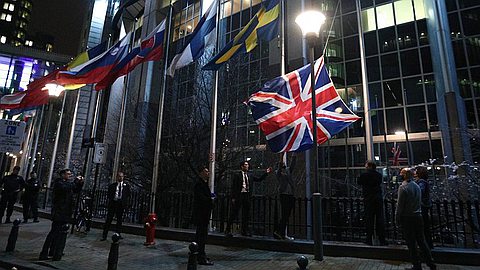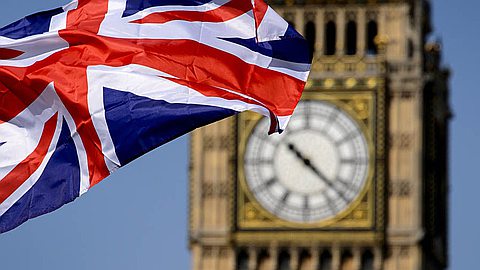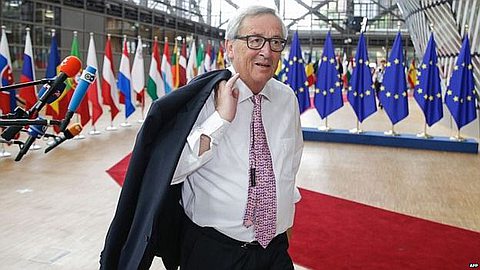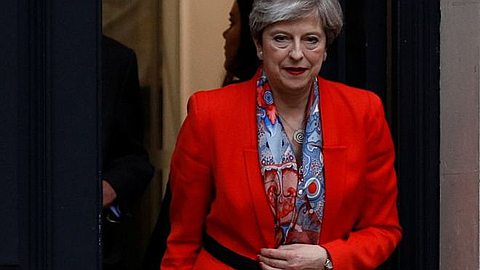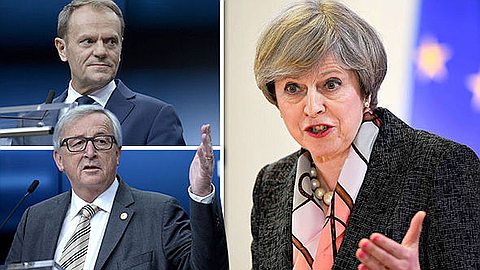Brexit or No, Europe's "Realists" to Contain "Utopians"
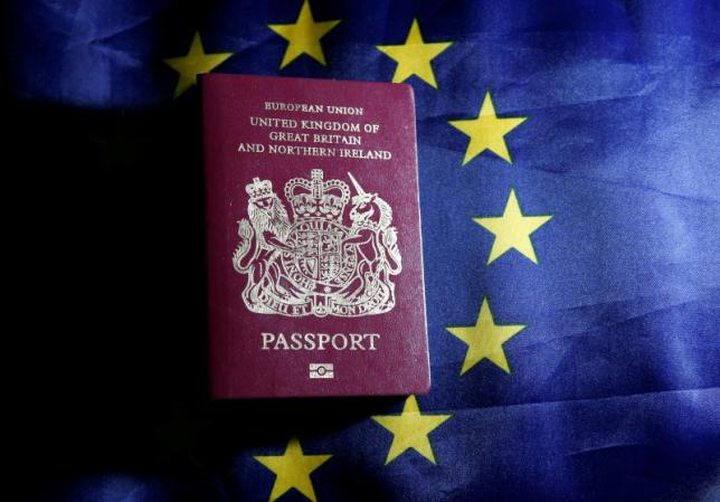
A British passport is pictured in front of an European Union flag
The Brexit debate is echoed in mounting euroscepticism across much of the continent. This is fuelling a struggle which, crudely put, pits those who want a more integrated Union against self-styled "realists", who dismiss them as "utopian" dreamers disregarding democratic attachment to nation states.
Positions are more nuanced and few leaders are arguing for a big shift in power to Brussels.
But the confrontation can be seen in permanent tensions between the central institutions of the European Parliament and the executive European Commission on one hand and a majority of the 28 governments that wield ultimate power in the Council.
Nations' resistance to ceding rights surfaces in fury among some governments at the Commission's drive to force them to take in refugees or to accept more intrusive EU supervision of euro zone budgets. It puts any federalists on the weaker foot -- not least as France and Germany prepare elections next year with eurosceptics riding high in the polls.
Council President Donald Tusk, who will chair a summit on Tuesday and Wednesday to react to the British vote, called on leaders to use the moment to reflect on where Europe has gone wrong. He has also argued that pushing for "more Europe" would only fuel popular hostility to the EU.
"Whatever its result is going to be, we must take a long, hard look on the future of the Union," Tusk said on Monday. "We would be foolish if we ignored such a warning signal."
The former Polish premier has denounced "utopian dreams" of a post-national Europe: "Promoting them only leads to the strengthening of eurosceptic moods," he said earlier this month.
No "great leap forward"
Some in Brussels interpreted his barbs as aimed at Commission President Jean-Claude Juncker, the Luxemburger whose executive enraged some national leaders by pushing them to accept binding quotas of refugees.
EU officials dismiss critics' suggestions that Juncker seeks a "great leap forward" in EU integration after the British vote. Whatever his ideals, he recognises there is no appetite for it among states.
His focus if Britain leaves, the officials said, would be to help keep the other 27 from disintegrating in its wake.
Juncker himself dismisses suggestions that he is a utopian. "I am no euro-fanatic," he told the Frankfurter Allgemeine Zeitung, though he stoutly defended his migration policy.
"The EU must not be constructed in opposition to the nations of Europe," he added. "Europe's future lies in a better Europe, not necessarily in 'more Europe'."
That view frustrates the most outspoken federalists such as Guy Verhofstadt, the former Belgian premier who leads the liberal bloc in the European Parliament, itself a bastion of left-right consensus on strengthening its own power.
"Europe will be totally different after June 23, whether it’s a Yes or a No," he told reporters in Paris. "We must take advantage of Brexit to refound Europe. Political leaders have their backs to the wall. They don’t have any other choice."
"Fix what we have"
German and French officials do not see it that way.
French President Francois Hollande, who lags in polls ahead of next April's presidential election behind anti-EU populist Marine Le Pen and mainstream conservative rivals, will visit German Chancellor Angela Merkel in Berlin next week to launch new EU initiatives.
But a senior French official, echoing EU officials, told Reuters there was no prospect of big change. "We don't need either a great federal leap forward or to try to cuddle up to the most fanatical sceptics by deconstructing the EU," he said.
"It would look ridiculous to come out with a detailed blue-print for the way forward a day after Britain voted to leave."
In Germany, Finance Minister Wolfgang Schaeuble, who in the 1990s advocated a much more integrated "core Europe", has been clear in his view that the days of grand visions have passed.
At a meeting with Schaeuble this week, the Dutch chairman of euro zone finance ministers Jeroen Dijsselbloem showed that even among the hard core of euro states, few see a rapid deepening of integration. "Let's not build further extensions to the European house while it is so unstable. Let's fix what we have," he said.
Lack of action carries risks too. A policy document known as the Five Presidents' Report called last year for euro zone states to share more responsibility to stabilise a common currency battered by the debt crisis.
But differing French and German approaches, and next year's elections, have stalled the process, and the voters' mood has made leaders wary of pushing ahead.
"We can't go on like we have," said Schaeuble, who has been blocking proposals for a European bank deposit insurance scheme. "Or people will say 'They haven't understood'."
That argues against the option that smaller groups of states, such as the 19-nation euro zone or the core of the bloc's six Western founders, might move soon towards deeper integration while others, including Britain if it stays, hold back from some of Europe's projects.
Such two-track integration seems barely more likely if there is Brexit.
While some federalists might call for a dash for unity if the awkward British were to go, most key players favour avoiding rifts among those who remained inside the bloc. The priority would be to make the remaining EU irreversible.
As one senior EU official put it: "Europe's got a slap in the face; let's see what we have to do to keep the 27 together."
